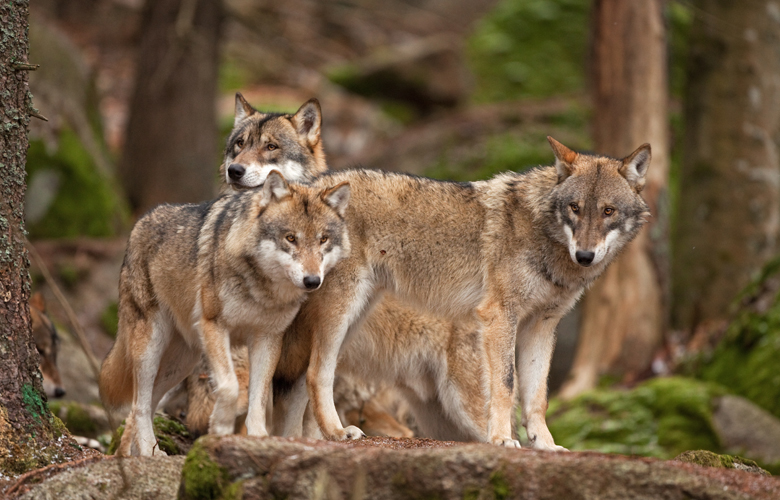“The situation has gotten out of hand. We don’t know where to hide,” the residents say
In the village square they see one wolf to be visited once or twice a week by the residents of Kyriakohori in West Fthiotida. East of the village of Anavra in Magnesia, in the mountains of Mount Othrys, the inhabitants hear the howls of wolves almost every night. The same images are described by the residents on the ridge of Kallidromos from Eleftherochori to Xylikos but also in Oiti and Agrafa.
“The situation has gotten out of hand. We don’t know where to hide. At present wolves find and eat sheep, cows and goats. What if they get hungry? Will they attack people?’ Dionysis Kyriopoulos from West Fthiotida notes to APE BEE that in the last two years he has seen his herd continuously decrease and he himself is worried “if he should keep them or take them to the slaughterhouse” as he says.
The same messages from the area of Kallidromos, from Oiti, from the villages of Othrios, north from Stylida.
“The disturbances have been constant in recent years, but in the area of Fthiotida the wolf is protected from European conditions. There is a correspondence with the relevant services but that’s it. After all, any measures will arise after scientific studies” emphasizes Panagiotis Kravaritis, forester of the Forestry of Lamia, who has been dealing with the specific issues for decades and is actually the one who receives, almost daily, the pressures from the breeders for the situation that has developed.
“There are areas where the wild boar has been restricted and the hunters who go find only wolves in front of them” notes Kostas Margaritis, a hunter himself who speaks to APE-MBE and states that “from Anavra in Magnesia to Paleokerasia in Fthiotida, a distance of 20 kilometers, the wolves hunt the wild boars and even do not hesitate to reach into the plain. In previous years they would hear dogs or people and run away. Now they sit and wait.”
In the mountain villages, if they do not see the wolves in the streets and courtyards of the villages, they hear their howls, almost every night.
“What we are seeing in the last year we have not seen in our entire life. Herds of wolves kill large free range cows weighing up to 300 kg each. In the last month alone, more than 10 animals have been eaten in the area,” underlines Angeliki Papaioannou, who has been counting the losses and looking for her animals in rugged areas, but has not found them, speaking to APE BEE. But he also sees animals returning injured from the battle they fought with the wolves. “I found two and declared them to ELGA, but the compensations are insignificant. The rest I may find bones after 1 or 2 months and there is no compensation. Wolves don’t make appointments for us…”
The breeders talk about packs of wolves and in fact, they talk about seven or eight packs regionally from the village of Eleftherochori. “If the situation continues, if the wolf packs are not controlled, then the free-range cattle will disappear,” says Vasiliki Papaioannou, who also keeps a herd of cows in Kallidromos, to APE-MPE.
The same situation in Evrytania as far as the distant Agrafa. “Agrafa is developing into a breeding ground for wolves. Herds are disappearing and animal husbandry is constantly declining. We will eliminate the sheep and make packs of wolves. The situation is hopeless…” says Giannis Goulas to APE-MPE, describing the desperation of livestock farmers in the Agrafa region of Evrytania.
The requests received by ELGA for compensation are varied, but according to Dionysis Kyriopoulos “it is a complex process as we will have to locate the killed animals within 48 hours in the steep mountains, find the hooves and hand them over because otherwise we will not ELGA covers us. Such a thing is unlikely, therefore there is no compensation and this brings despair to the breeders themselves” as he characteristically says.
It is worth noting that the entire area of Fthiotida is located below the 39th parallel where absolute protection of the wolf is required as in previous years it was endangered.
Cattle breeders and mountain dwellers speak bluntly of “overpopulation that has crossed the line”. Arcturus scientists who monitor its evolution have an opposite opinion.
“The fact that some residents in mountain villages see wolves more often near their villages does not mean that we have overpopulation. After all, at the national level there are between 700 and 1,000 wolf individuals”, emphasizes Panagiotis Stefanou, the communication manager of Arctouros, speaking to APE-MPE. At the same time, he notes that “there are no specific population figures for the region of Fthiotida and Evrytania as there is movement of people from region to region”.








